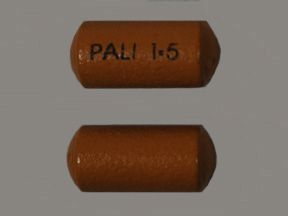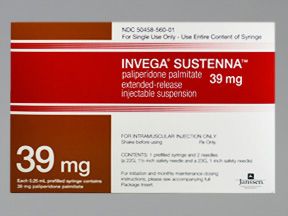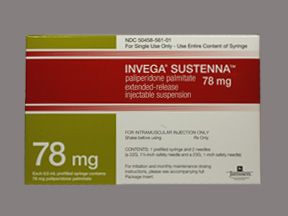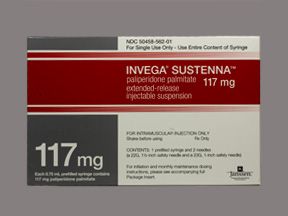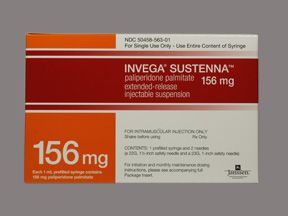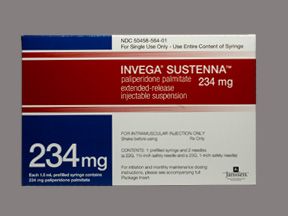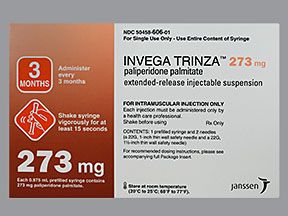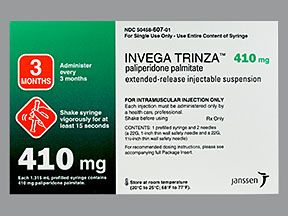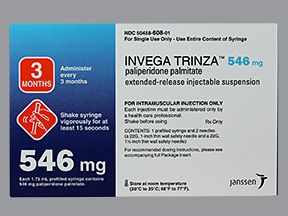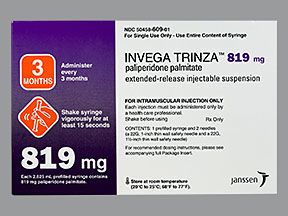Invega Trinza is a brand-name prescription medication. It’s FDA-approved to treat schizophrenia in certain adults. Specifically, Invega Trinza treats schizophrenia in people who’ve received at least 4 months of treatment with Invega Sustenna. (Invega Sustenna is another drug used to treat schizophrenia.)
Drug details
Invega Trinza contains an extended-release form of the active drug paliperidone palmitate. (Extended-release means the drug releases slowly in your body, over a period of time.) It belongs to a group of drugs called atypical antipsychotics.
Invega Trinza comes as a liquid suspension in a prefilled syringe. It’s given as an intramuscular injection by your doctor or another healthcare professional at a medical clinic or doctor’s office.
Invega Trinza comes in four strengths. For more information, see the “Invega Trinza dosage” section below.
Invega Trinza vs. Invega, Invega Sustenna, and Invega Hafyera
This article focuses on Invega Trinza, but other forms of Invega are available. These include Invega, Invega Sustenna, and Invega Hafyera.
Invega’s active drug is paliperidone and it comes as an oral tablet. Invega Sustenna and Invega Hafyera contain the active drug paliperidone palmitate. They come as liquid suspensions that are given as intramuscular injections.
If you’re interested in taking another form of Invega, talk with your doctor. They can tell you about the similarities and differences of the drugs. This includes their dosage schedule, side effects, and costs. They can also advise which drug is best to treat your condition.
Effectiveness
For information about the effectiveness of Invega Trinza, see the “Invega Trinza uses” section below.
The active ingredient of Invega Trinza is paliperidone palmitate. It’s available only as a brand-name medication. Invega Trinza is not currently available in generic form.
A generic drug is an exact copy of the active drug in a brand-name medication. Generics usually cost less than brand-name drugs.
The Invega Trinza dosage your doctor prescribes will depend on several factors. These include:
- the strength of your last dose of Invega Sustenna*
- other medical conditions you may have, including kidney problems
Your doctor may adjust your dose over time to reach the amount that’s right for you. They will ultimately prescribe the lowest dose that provides the desired effect.
The following information describes dosages that are commonly used or recommended. Your doctor will determine the best dosage to fit your needs.
* Invega Trinza is prescribed to treat schizophrenia in adults who’ve received at least 4 months of treatment with Invega Sustenna. (Invega Sustenna is another drug used to treat schizophrenia.)
Drug forms and strengths
Invega Trinza comes as a liquid suspension in a prefilled syringe. It’s given as an intramuscular injection by your doctor or another healthcare professional at a medical clinic or doctor’s office.
Invega Trinza is available in four strengths:
- 273 milligrams (mg) per 0.88 milliliter (mL)
- 410 mg/1.32 mL
- 546 mg/1.75 mL
- 819 mg/2.63 mL
Dosage for schizophrenia
Invega Trinza is used to treat schizophrenia in adults who’ve received at least 4 months of treatment with Invega Sustenna. Both Invega Trinza and Invega Sustenna contain the same active drug, paliperidone palmitate. However, they have different dosing schedules. Invega Trinza is given once every 3 months and Invega Sustenna is given once per month.
Your prescribed dose of Invega Trinza will depend on the strength of your last dose of Invega Sustenna. For example, if your last dose of Invega Sustenna was 78 mg, your prescribed dose of Invega Trinza will be 273 mg. Your doctor will determine the dose that’s right for you.
What if I miss a dose?
Invega Trinza is given once every 3 months. It is important not to miss any of your doses of Invega Trinza. Your doctor’s office will work with you to schedule your injection appointments.
If you’re unable to make your appointment, you may be able to receive your dose up to 2 weeks before or after your scheduled dose. If you miss an injection, contact your doctor’s office to reschedule your missed dose.
If more than 3.5 months have passed since your last Invega Trinza injection, talk with your doctor. Depending on how long it’s been since your last injection, your doctor may restart your treatment with Invega Sustenna. If this is needed, your doctor will explain the dosing schedule.
To help make sure that you don’t miss a dose, try using a medication reminder. This can include setting an alarm on your phone or noting your injection appointments on your calendar. You can also use a reminder app.
Will I need to receive this drug long term?
Invega Trinza is meant to be used as a long-term treatment. If you and your doctor determine that Invega Trinza is safe and effective for you, you’ll likely receive it long term.
Invega Trinza can cause mild or serious side effects. The following lists contain some of the key side effects that may occur while receiving Invega Trinza. These lists do not include all possible side effects.
For more information about the possible side effects of Invega Trinza, talk with your doctor or pharmacist. They can give you tips on how to manage any side effects that may be concerning or bothersome.
Note: The Food and Drug Administration (FDA) tracks side effects of drugs it has approved. If you would like to notify the FDA about a side effect you’ve had with Invega Trinza, you can do so through MedWatch.
Mild side effects
Mild side effects* of Invega Trinza can include:
- injection site reactions, such as pain, swelling, discoloration, redness, or a lump
- weight gain
- headache
- upper respiratory infection, such as the common cold
- akathisia (feeling restless and having a continuous urge to move around)
Most of these side effects may go away within a few days to a couple of weeks. But if they become more severe or don’t go away, talk with your doctor or pharmacist.
* This is a partial list of mild side effects from Invega Trinza. To learn about other mild side effects, talk with your doctor or pharmacist, or view Invega Trinza’s prescribing information.
Serious side effects
Serious side effects have been reported with the use of atypical antipsychotic drugs. (Invega Trinza is an atypical antipsychotic.) Although not all of the following side effects were seen in Invega Trinza’s clinical trials, they are still possible. Call your doctor right away if you have serious side effects. Call 911 or your local emergency number if your symptoms feel life threatening or if you think you’re having a medical emergency.
Serious side effects and their symptoms can include:
- Neuroleptic malignant syndrome (a rare neurological reaction to the use of antipsychotic drugs). Symptoms can include:
- fever
- stiff muscles
- excessive sweating
- fast or irregular heart rate
- QT prolongation, also called long QT syndrome. This is a serious problem in the heart’s rhythm. Symptoms can include:
- dizziness
- fainting
- heart palpitations
- Tardive dyskinesia (a syndrome that causes repeated, uncontrollable movements). Symptoms can include:
- lip smacking
- unusual face or tongue movements
- swaying
- Changes in your metabolism, which may cause:
- high cholesterol or other lipid disorders
- high blood sugar, which can lead to type 2 diabetes
- Parkinsonism, a group of symptoms that are similar to the symptoms of Parkinson’s disease, such as:
- face or body movements you can’t control
- jerky movements
- muscle stiffness
- tremors
- drooling
- Orthostatic hypotension (a drop in blood pressure that occurs when standing up). Symptoms may include:
- dizziness
- fainting
- falling, which may lead to injury
- Low levels of white blood cells. Symptoms may include:
- infection
- fever
- High blood levels of a hormone called prolactin. Symptoms can include:
- erectile dysfunction or gynecomastia (breast growth) in males*
- missed periods or galactorrhea (nipple discharge) in females*
- Changes in how your body regulates its temperature. Symptoms may include:
- fever
- changes in how much you sweat
- Seizures. Symptoms may include:
- convulsions (uncontrollable muscle contractions)
- repeated jerking movements
- muscle stiffness
- Stroke in older adults with psychosis related to dementia. Symptoms of stroke may include:
- inability to move one side of your face or body
- trouble seeing or speaking
- confusion
- Sleepiness and reduced mental alertness, which may affect your ability to drive or operate heavy machinery.
- Trouble swallowing.
- Priapism (a painful erection that lasts for hours).
- Increased risk of death in older adults with psychosis related to dementia.†
* Sex and gender exist on spectrums. Use of the terms “male” and “female” in this article refers to sex assigned at birth.
† Invega Trinza has a
ALLERGIC REACTION
As with most drugs, some people can have an allergic reaction after receiving Invega Trinza. This side effect wasn’t reported in clinical trials of this drug but it can still occur.
Symptoms of a mild allergic reaction can include:
A more severe allergic reaction is rare but possible. Symptoms of a severe allergic reaction can include:
- swelling under your skin, typically in your eyelids, lips, hands, or feet
- swelling of your tongue, mouth, or throat
- trouble breathing
Call your doctor right away if you have an allergic reaction to Invega Trinza, as the reaction could become severe. Call 911 or your local emergency number if your symptoms feel life threatening or if you think you’re having a medical emergency.
As with all drugs, the cost of Invega Trinza can vary. The actual price you’ll pay for Invega Trinza depends on your insurance plan, your location, and the strength you use. For example, the cost of Invega Trinza 819 milligrams (mg) may be higher than the cost of lower strengths of the drug. (For more information about the strengths of Invega Trinza, see the “Invega Trinza dosage” section above.)
Before approving coverage for Invega Trinza, your insurance company may require you to get prior authorization. This means that your doctor and insurance company will need to communicate about your prescription before the insurance company will cover the drug. The insurance company will review the prior authorization request and decide if the drug will be covered.
If you’re not sure whether you’ll need to get prior authorization for Invega Trinza, contact your insurance company.
Financial and insurance assistance
If you need financial support to pay for Invega Trinza, or if you need help understanding your insurance coverage, help is available.
A program called Janssen CarePath is available for Invega Trinza. For more information and to find out if you’re eligible for support, call 877-227-3728 or visit the program website.
To learn more about saving money on prescriptions, check out this article.
Generic version
The active ingredient of Invega Trinza is paliperidone palmitate. Invega Trinza is not available in a generic form.
A generic drug is an exact copy of the active drug in a brand-name medication. Generics tend to cost less than brand-name drugs.
Note: Invega comes in other forms, such as an extended-release oral tablet. (Extended-release means the drug releases slowly in your body, over a period of time.) Invega’s active ingredient, paliperidone, is also available as a generic drug. If you’re interested in taking this generic drug, talk with your doctor. (For additional information, see “Invega Trinza vs. Invega, Invega Sustenna, and Invega Hafyera” in the “What is Invega Trinza” section above.)
Here are answers to some frequently asked questions about Invega Trinza.
How long does Invega Trinza work in the body?
Invega Trinza is an extended-release injection. (Extended-release means the drug releases slowly in your body, over a period of time.) Each Invega Trinza dose is meant to work for 3 months.
If your doctor recommends you stop receiving Invega Trinza, the drug will stay in your system for a long time after your last dose. This is because Invega Trinza has a long half-life of 84 to 139 days. (A drug’s half-life is the length of time it takes for half of a dose to be removed from your body.)
For example, if you receive an 819-mg dose of Invega Trinza, a low level of the drug may still be in your blood up to 18 months later.
If you have questions about how long Trinza will stay in your body, talk with your doctor.
How can I stop Invega Trinza treatment?
If you and your doctor decide that you’ll stop Invega Trinza treatment, keep in mind that the drug will continue working for 3 months after your last dose. At that point, your doctor will likely prescribe a different drug to replace Invega Trinza.
You should not stop treatment with Invega Trinza without first talking with your doctor. Your doctor will listen to any concerns you may have. And they’ll help you decide on the best treatment plan for schizophrenia.
What is the difference between Invega Trinza and other forms of Invega, such as Invega Sustenna?
Invega Trinza is used to treat schizophrenia in adults who’ve received at least 4 months of treatment with Invega Sustenna.
Both of these medications contain the same active drug, paliperidone palmitate. However, Invega Sustenna is given once per month, while Invega Trinza is given every 3 months.
If you have questions about other forms of Invega, talk with your doctor. You can also view “Invega Trinza vs. Invega, Invega Sustenna, and Invega Hafyera” in the “What is Invega Trinza” section above.
The Food and Drug Administration (FDA) approves prescription drugs such as Invega Trinza to treat certain conditions. Invega Trinza may also be used off-label for other conditions. Off-label drug use is when an FDA-approved drug is prescribed for a purpose other than what it’s approved for.
Invega Trinza for schizophrenia
Invega Trinza is FDA-approved to treat schizophrenia in certain adults. Specifically, Invega Trinza treats schizophrenia in people who’ve received at least 4 months of treatment with Invega Sustenna.
Invega Sustenna is another drug used to treat schizophrenia. It has the same active drug as Invega Trinza, paliperidone palmitate. However, Invega Sustenna is given once per month, while Invega Trinza is given every 3 months. (To learn about how often Invega Trinza is given, see the “Invega Trinza dosage” section above.)
Schizophrenia explained
Schizophrenia is a chronic (long-term) mental illness. This condition affects the way a person thinks, feels, and behaves. It often starts in adolescence or young adulthood.
Symptoms of schizophrenia may include:
- hallucinations (seeing or hearing things that aren’t really there)
- paranoia (feeling like others are out to get you)
- delusions (strongly believing in something that’s proven false)
- unusual behaviors
- little or no emotional expression
- trouble paying attention and completing tasks
You can learn more about schizophrenia and mental health by visiting Medical News Today’s mental health hub.
Effectiveness for schizophrenia
Currently, there are no treatments that cure schizophrenia or make it go away. It’s a chronic condition. However, drugs, such as Invega Trinza, are available to help reduce the symptoms of the condition and improve quality of life.
In clinical trials, Invega Trinza was shown to be effective for treating schizophrenia in adults. The American Psychiatric Association guidelines recommend this medication as a treatment option for schizophrenia.
If you have questions about what to expect from Invega Trinza treatment, talk with your doctor.
Invega Trinza and children
Invega Trinza is only FDA-approved for use in adults. The drug is not approved for use in children or adolescents.
Invega Trinza is an injection that contains the active ingredient paliperidone palmitate, an extended-release drug. (Extended-release drugs are released into your system slowly, over a period of time.) Once Invega Trinza is in your body, it’s converted from paliperidone palmitate to paliperidone.
It isn’t known for sure how paliperidone works to treat schizophrenia. But it’s thought to decrease the symptoms of this condition. It may do this by affecting the activity of certain neurotransmitters (chemical messengers) in the brain. These may include dopamine and serotonin.
How long does it take to work?
Invega Trinza starts working right away after you receive a dose.
Keep in mind that Invega Trinza is only prescribed to adults who’ve already received treatment with Invega Sustenna for at least 4 months. Invega Sustenna is another drug used to treat schizophrenia, and it contains the same active drug as Invega Trinza. So, Invega Trinza should continue to work as Invega Sustenna did.
If your doctor adjusts your dose of Invega Trinza, it may take several months until you see any difference in your symptoms.
You should not drink alcohol while you are receiving Invega Trinza treatment. Doing so could increase the risk of serious side effects, such as excessive sleepiness and reduced mental alertness. (For more information about these side effects, see the “Invega Trinza side effects” section above.)
If you have questions about alcohol use and Invega Trinza, talk with your doctor.
Invega Trinza can interact with several other medications. It can also interact with certain supplements.
Different interactions can cause different effects. For instance, some interactions can interfere with how well a drug works. Other interactions can increase side effects or make them more severe.
Invega Trinza and other medications
Below is a list of drugs that can interact with Invega Trinza. This list does not contain all drugs that may interact with Invega Trinza.
Before starting Invega Trinza treatment, talk with your doctor and pharmacist. Tell them about all prescription, over-the-counter, and other drugs you take. Also tell them about any vitamins, herbs, and supplements you use. Sharing this information can help you avoid potential interactions.
Your doctor will typically not prescribe Invega Trinza with the following drugs:
- Drugs that slow down the central nervous system (CNS) and cause sleepiness. Invega Trinza may cause excessive sleepiness or reduced mental alertness. If you take other medications that may cause similar effects, your CNS activity may slow down. This could lead to an unsafe level of sedation (sleepiness) or trouble breathing. Examples of these drugs include:
- opioids, such as oxycodone (OxyContin)
- benzodiazepines, such as lorazepam (Ativan)
- muscle relaxers, such as carisoprodol (Soma)
- Drugs that can cause orthostatic hypotension (OH). Invega Trinza may cause OH, which is a drop in blood pressure that occurs when standing up. If you take other medications that may cause OH, you may have an increased risk for this side effect. Examples of drugs that can cause OH include:
- diuretics, such as furosemide (Lasix)
- alpha-blockers for benign prostatic hyperplasia such as tamsulosin (Flomax)
- Drugs that affect CYP3A4 and P-gp. CYP3A4 and P-gp are enzymes involved in how your body breaks down and processes Invega Trinza. If you take medications that affect the activity of these enzymes, Invega Trinza may not work correctly. Examples of these drugs include:
- certain seizure medications, such as carbamazepine (Tegretol)
- the antibiotic rifampin (Rimactane)
- Levodopa. Invega Trinza may reduce the effects of levodopa, a medication used to treat Parkinson’s disease.
If you have questions about drug interactions that may affect you, ask your doctor or pharmacist.
Invega Trinza and herbs and supplements
St. John’s wort (an herb thought to have benefits for depression) may interact with Invega Trinza. Taking this herb during Invega Trinza treatment could make Invega Trinza less effective in treating your condition.
No other herbs or supplements have been specifically reported to interact with Invega Trinza. However, you should still check with your doctor or pharmacist before using any of these products while receiving Invega Trinza.
Invega Trinza and foods
There aren’t any foods that have been specifically reported to interact with Invega Trinza. If you have any questions about eating certain foods with this drug, talk with your doctor.
Invega Trinza comes as a liquid suspension (mixture) in a prefilled syringe. It’s prepared and given by your doctor or another healthcare professional at a medical clinic or doctor’s office. They’ll give you your dose as an intramuscular injection in your gluteal muscle (buttocks) or deltoid muscle (upper arm).
When it’s given
You’ll receive Invega Trinza once every 3 months.
To help make sure that you don’t miss a dose, try using a medication reminder. This can include setting an alarm on your phone and noting the injection appointments on your calendar. You can also use a reminder app.
It’s not known if Invega Trinza is safe to receive during pregnancy.
Your doctor may not prescribe Invega Trinza if you’re pregnant or trying to become pregnant. However, you and your doctor can decide whether to have Invega Trinza treatment after considering its risks and benefits.
Exposure to antipsychotic drugs during the third trimester of pregnancy may lead to withdrawal symptoms in a newborn after birth. (Invega Trinza is an antipsychotic drug.) Withdrawal symptoms are uncomfortable reactions that occur when you stop receiving a substance your body is used to having.
Withdrawal symptoms can be mild to severe, and may include:
- agitation
- rigid or limp muscles
- tremors
- excessive sleepiness
- trouble breathing
- feeding problems
If you’re having Invega Trinza treatment during pregnancy,* consider enrolling in the National Pregnancy Registry for Psychiatric Medications. Pregnancy registries collect information on the safety of certain drugs when taken during pregnancy. To learn more, call 866-961-2388 or talk with your doctor.
* Keep in mind that Invega Trinza stays in your system for a long time. A low level of the drug may remain in your blood 18 months or longer after your last dose. (For more information, see “How long does Invega Trinza work in the body?” in the “Common questions about Invega Trinza” section above.)
Invega Trinza and fertility
Invega Trinza may affect female* fertility (ability to become pregnant). This is because the drug may increase blood levels of a hormone called prolactin. High prolactin levels can affect your menstrual cycle, causing irregular cycles or no periods.
If your doctor recommends you stop Invega Trinza treatment, your fertility will likely go back to what it was before you started treatment.
Invega Trinza isn’t known to affect male* fertility.
If you have questions about your fertility with Invega Trinza treatment, talk with your doctor.
* Sex and gender exist on spectrums. Use of the terms “female” and “male” in this article refers to sex assigned at birth.
It’s not known if Invega Trinza is safe to receive during pregnancy.
If you’re sexually active and you or your partner can become pregnant, talk with your doctor about your birth control needs while you’re receiving Invega Trinza treatment.
For more information about receiving Invega Trinza during pregnancy, see the “Invega Trinza and pregnancy” section above.
It is unknown if it’s safe to receive Invega Trinza while breastfeeding.
The drug is known to pass into breast milk. This may cause the following side effects in a breastfed child:
- excessive sleeping
- not growing as expected
- acting jittery
- tremors
- unusual movements
If you’re interested in breastfeeding your child during treatment with Invega Trinza, talk with both your doctor and your child’s doctor. If they recommend you breastfeed your child, they’ll likely recommend you monitor them closely for the above side effects. And they’ll recommend monitoring them for at least 18 months after you stop treatment with the drug.
If you have questions about breastfeeding with Invega Trinza treatment, talk with your doctor.
This drug comes with several precautions.
FDA warning: Increased risk of death in older adults with psychosis related to dementia
This drug has a
Invega Trinza belongs to a group of drugs called atypical antipsychotics. Drugs of this type may increase the risk of death in older adults (ages 65 years and older) with psychosis related to dementia (cognitive decline). For this reason, doctors typically do not prescribe Invega Trinza to treat psychosis in older adults with dementia.
Also, Invega Trinza is not FDA-approved to treat psychosis in any age group. (Psychosis is a loss of touch with reality.) Instead, it’s only approved to treat schizophrenia in certain people. (For more information, see the “Invega Trinza uses” section above.)
If you have questions about this risk, talk with your doctor.
Other precautions
Before having Invega Trinza treatment, talk with your doctor about your health history. Invega Trinza may not be right for you if you have certain medical conditions or other factors affecting your health. These include:
- Heart problems or low blood pressure. Invega Trinza may cause orthostatic hypotension. If you already have heart problems, such as heart failure, or low blood pressure, you may have an increased risk for this side effect. If you’re prescribed Invega Trinza, your doctor may monitor you closely during your treatment.
- Seizure disorder. Invega Trinza may cause seizures as a side effect. If you already have a seizure disorder, talk with your doctor. They can help decide if this drug is safe for you.
- Diabetes. Invega Trinza may cause changes in your body’s metabolism, including high blood sugar. If you already have diabetes, receiving this drug may worsen your condition. Your doctor may need to adjust your diabetes treatment and monitoring plan while you’re receiving Invega Trinza.
- Kidney problems. If you have kidney problems, talk with your doctor before starting Invega Trinza treatment. Your doctor typically will not prescribe this drug if you have moderate to severe kidney problems. If you have mild kidney problems, your doctor may prescribe a low dose of Invega Trinza. (For information about dosage, see the “Invega Trinza dosage” section above.)
- Severe liver problems. If you have severe liver problems, your doctor may not prescribe Invega Trinza. The drug hasn’t been studied in people with severe liver problems. Your doctor may prescribe a different treatment option for you.
- Allergic reaction. If you’ve had an allergic reaction to risperidone, paliperidone, Invega Sustenna or any of its ingredients, your doctor will likely not prescribe Invega Trinza. Ask your doctor about other drugs that may be better options for you.
- Pregnancy. It’s not known if Invega Trinza is safe to receive during pregnancy. For more information, see the “Invega Trinza and pregnancy” section above.
- Breastfeeding. It is unknown if it’s safe to receive Invega Trinza while breastfeeding. For more information, see the “Invega Trinza and breastfeeding” section above.
Note: For more information about the potential negative effects of Invega Trinza, see the “Invega Trinza side effects” section above.
Disclaimer: Medical News Today has made every effort to make certain that all information is factually correct, comprehensive, and up to date. However, this article should not be used as a substitute for the knowledge and expertise of a licensed healthcare professional. You should always consult your doctor or another healthcare professional before taking any medication. The drug information contained herein is subject to change and is not intended to cover all possible uses, directions, precautions, warnings, drug interactions, allergic reactions, or adverse effects. The absence of warnings or other information for a given drug does not indicate that the drug or drug combination is safe, effective, or appropriate for all patients or all specific uses.

